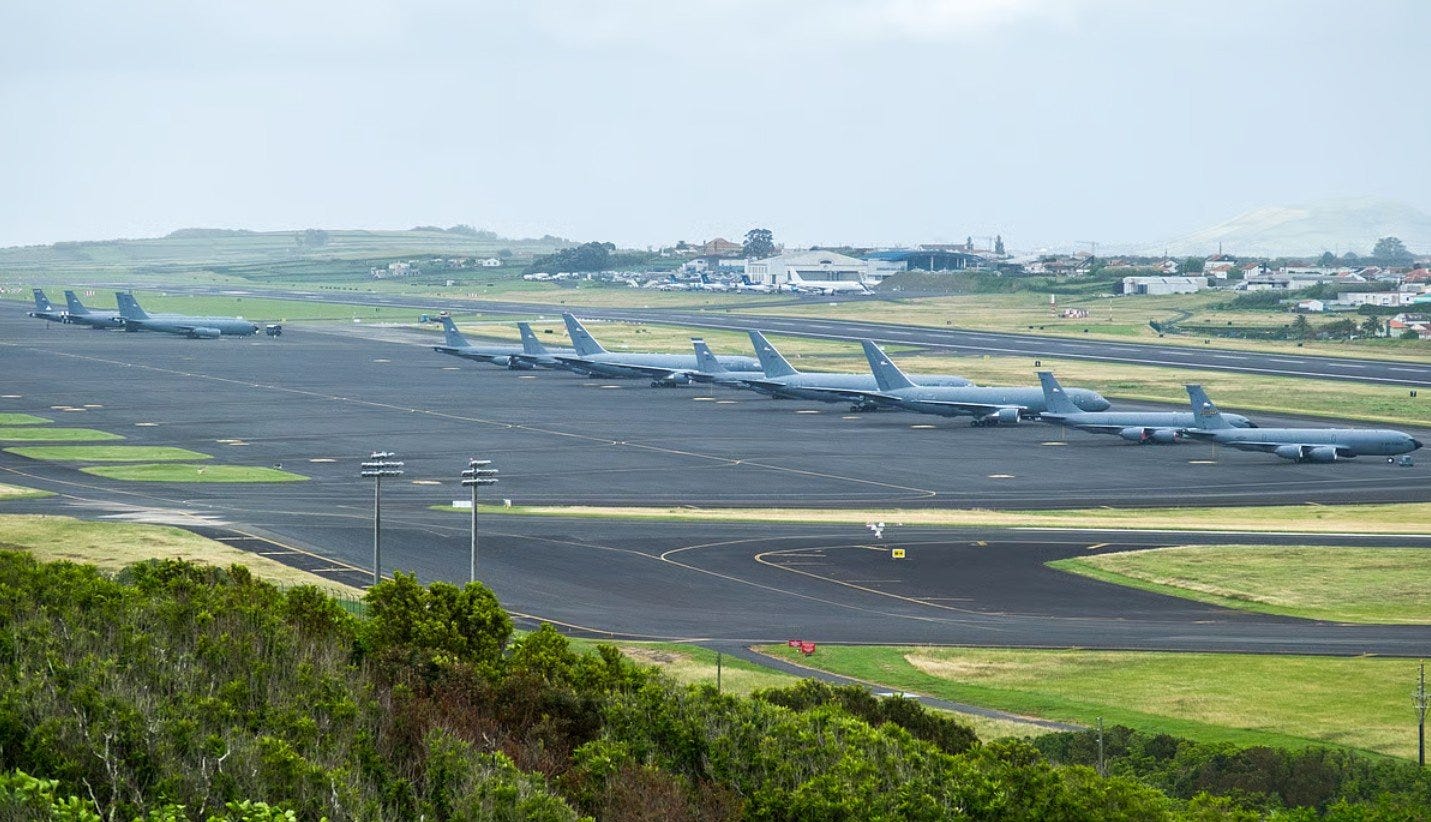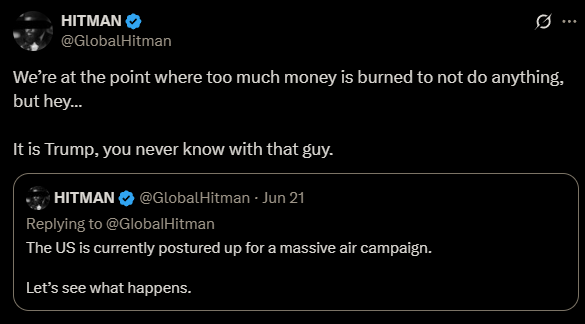Israel's Brilliance and Failure
Operational Brilliance and Political Failures
Israel’s military is top-flight. If they had the numbers and equipment, they would probably be second only to the United States. But unfortunately, as we’re observing in the Ukraine war, “quantity has a quality of its own.” Where Israel always seems to struggle is in their political leadership. Today we’re going to talk about Israel’s 12 day operation in Iran and why it was a failure.
The War
Last week I wrote about the first few days of the attack, if you didn’t catch it you can read about it here:
After my article, Israel continued to bomb targets in Iran, and Iran continued to rain missiles down on Israel. Meanwhile, throughout that weekend, the U.S. was moving assets into the area. Tons of refueling aircraft (tankers) were flying east toward Europe, and U.S. aircraft carrier groups sailed toward the Middle East. As the week progressed, more tankers were flying east from the U.S. Footage from relevant bases started to emerge showing tons of U.S. aircraft.
After everything I observed, one thing was clear: you don’t move all of this equipment just to bluff. If the US wanted to bluff, they could have done it by moving a few carriers around. This was different.
I tweeted:
Old Dog, Old Tricks, New Age
A few hours after my tweet, it happened: the U.S. struck Iranian nuclear sites. But hours before that, the Pentagon deceived the world. Some B-2 bombers were flown from a base in the U.S. and headed west. The tankers had their transponders on for everyone to observe and speculate. There are free websites where anyone can track aircraft with their transponders on. Open source intelligence accounts on Twitter were speculating that the bombers were going to Diego Garcia in the Pacific. To further confuse them, an anonymous "U.S. official" told the press the bombers were headed to Guam. Meanwhile, the real strike package was flying east with their transponders off.
I was asked about the movement on my Discord and said this:
In the past few years, open source intelligence gathering has become a very respectable job. It’s the collection and analysis of data gathered from non-classified sources and tools. The easier it became to share information online, the easier it got for people to aggregate information and put it all in one place. More transparent militaries like the U.S. are forced to play chess instead of poker. In a world where everyone has a phone and internet access, it’s hard to hide your intentions. Faced with this new age, what did the Pentagon do? They gave everyone somewhere to look while they went the other direction; classic magic trick.
Look here:
Nope:
Operation Midnight Hammer Overview:
Seven B‑2 Spirit stealth bombers flew from Whiteman AFB, Missouri, on an approximately 18‑hour mission. The mission involved more than 125 U.S. aircraft, including tankers, surveillance planes, 4th/5th‑generation fighter jets, and more.
Timeline
The operation began around 2:10 am Iran time
U.S. submarines fired 24–30 Tomahawk cruise missiles at Isfahan just before the bombers entered Iranian airspace
4th- and 5th‑generation fighters (F‑22, F‑35, F‑18, etc.) cleared airspace and suppressed threats ahead of the B‑2s
The B‑2s dropped 14 GBU‑57 Massive Ordnance Penetrators (30,000‑lb bunker‑busters) on Fordow and Natanz, their first use in combat
After the B-2s dropped their ordinance the tomahawks from the submarines land at Isfahan
In total, around 75 precision-guided munitions were used
No enemy aircraft or air defenses responded to the strike package
Fordow was hit with a dozen bunker‑busters, while Natanz received two more. Tomahawks struck above-ground infrastructure in Isfahan
This was the largest B‑2 operational strike in U.S. history, and the longest B‑2 mission since Afghanistan in 2001, lasting roughly 37 hours round-trip
Israel’s Failure
Iran’s response to Midnight Hammer was the best thing they could have possibly done. This has always been the case, but it highlights how geopolitically Iran is still a logical actor, and they have not been overtaken by ideology.
To save face, Iran responded by attacking a U.S. base in Qatar, but they gave the U.S. a warning through backchannels. None of their 14 missiles reached the target. This was bad for Israel. It was in their interest for the U.S. to join them in the war, but Iran denied them that by not harming the U.S.
Before the attack, President Trump floated the idea of regime change in Iran:
Unfortunately, Trump ran his campaign on the false idea that he was the "no-war" president in his first term. Trump received tremendous backlash from his base after this post. This means he does not have the necessary political capital for any prolonged action against Iran.
This brings us back to my criticism of Israel in last week’s article. They did not set up the proper political environment before initiating their attack. For Israel, politics and international public support seem to be an afterthought. They seem to think they can overcome anything with might and wit alone. How naive. Historically, even the mighty U.S. makes sure to gather a coalition and launch a proper propaganda campaign before engaging in any large military conflict. Israel is a small country with roughly the same population as New York City. They don’t have the size to operate the way they’re choosing to.
If Israel had run this operation properly, they would have tried their best to secure the support of at least half the American people and a good portion of Europeans. Make it so that it’s not political suicide to join them on their venture.
There are tons of reports that Iran still has enriched uranium stockpiles that were not hit by U.S. and Israeli airstrikes. So far, the regime in Iran seems to be intact. Unless the Israelis have something new up their sleeves, this was a failure.
Why?
It’s a failure because in war, you don’t take half-measures against a determined adversary. Half-measures like this give Iran the chance to learn and get better. You don’t send your enemy back to the drawing board, you kill them. If you can’t do that, don’t start a war unless you have direct provocation.
Assuming the status quo holds, the Iranians have now experienced the full extent of Israel’s capabilities, and they’ll spend the next few years building back better.
Iran didn’t win this war, but Israel didn’t either.
The U.S. and Qatar mediated a ceasefire between Israel and Iran on June 24. Despite some initial confusion, as of writing this article, the ceasefire still holds. I predict Israel is going to have to act again in the near future because they’ll feel like all their work is going to waste.
As always, thank you for reading, please subscribe for more.










Nice one, I also believe that we will see the second act soon.